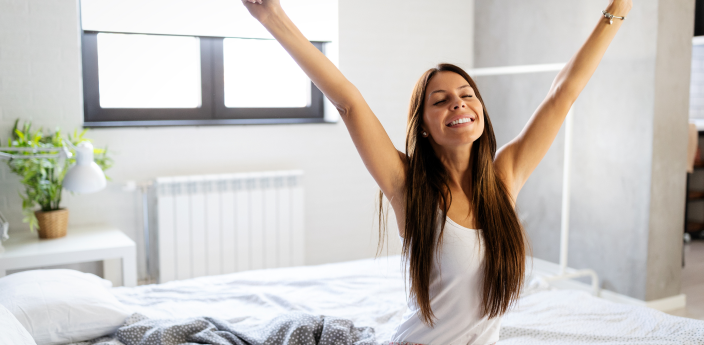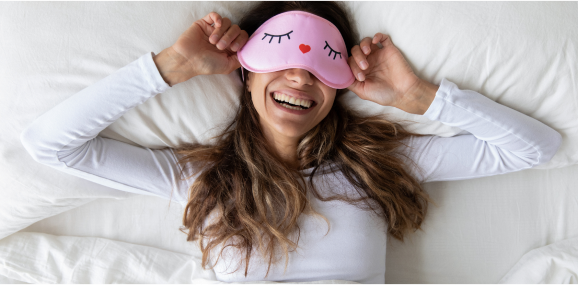Many people feel like sleeping is the least interesting part of their day. When you’re busy, sleep slips on the list of priorities until it becomes a backburner activity. You’ll work, cook, clean, take care of your family, and try to find an hour or so for yourself before you go to bed. Before you know it, the alarm clock is going off and your day’s in full swing.
You might not even notice how run down you feel. If you’re used to operating on insufficient sleep, you probably feel fatigued, stressed, and sore all the time. You might have even accepted this as your new normal. You shouldn’t, and it’s dangerous to let poor sleep habits go unaddressed.
Sleep is vital for the function of your mind and body. Are you getting enough sleep?
What Does Your Body Do When You’re Asleep?
You’re moving all day. Sometimes, your body needs you to stay still. When you’re asleep, your body uses the energy it would otherwise use to power itself for other vital purposes. Sleep is the only time your body has to focus its energy on repairing and restoring you to your best shape.
Your Mind Gets Organized
Everything that happened to you throughout the day exists within your short-term memory. When you’re asleep, your brain stores the important parts in your long-term memory. Your brain processes everything while you’re asleep, including your emotions. That’s why it sometimes helps to “sleep on” a big decision. Your brain organizes the information and related emotions overnight, and your perspective is clearer the next morning.
Sleep also helps you wash away a bad or stressful day. The intensity of your emotions will settle. Even if you’re still upset or stressed thinking about it the next day, the level at which it affects you will become more manageable.
Tissue and Muscle Fortifies and Repairs Itself
Day to day life puts wear and tear on your tissues and muscles. If you spend a significant amount of the day on your feet or if you’re really committed to fitness, you’re doing a lot more damage.
Damage to your muscles is actually the beginning of building strength and improving muscle tone. This damage isn’t bad, provided your body has enough time to adequately repair and fortify your muscles before you work out again.
This same process also helps your body to heal many things, including strains and overuse injuries experienced by people who sit at a desk or stand at a counter all day at work. Sleep is especially important after surgery, accidents, or injuries.
When you’re asleep, your body uses proteins, amino acids, and hormones to facilitate the repair process. It usually takes several nights of quality sleep for the body to make substantial progress.
Your Immune System Does Its Job
Your body sends up inflammatory signals when you’re injured or ill. In response to these inflammatory signals, your body sends cells that resolve the problem to the areas where they’re needed. This call and response happens while you’re sleeping.
Your body produces white blood cells that fight infection while you’re sleeping. If you don’t get enough sleep, your body may not produce enough of these cells to keep viruses and bacterial invaders at bay. This ultimately leads to poorer health through the weakening of your immune system.
What Can Lack of Sleep Do to Your Physical Health?
If you don’t get enough sleep, your body can’t heal or protect itself. The majority of your body’s responses to illness and injury occur while you’re sleeping. You may get sick more often or have worse symptoms when you do get sick. You may experience aches, pains, and muscle soreness when your body doesn’t have the time to patch itself back up.
This situation can create further complications. If you become reliant on over the counter painkillers to ease your aches and pains, you can damage your liver or your stomach lining. If you’re sick and unable to adequately combat your illness, every part of your body can suffer as a direct result.
While sleep isn’t anything close to a replacement for proper medical care for illness or injury, your body won’t be able to do what it needs to do to get better if you don’t get enough sleep. That’s why doctors emphasize the importance of adequate rest when the body needs to recover.
What Can Lack of Sleep Do to Your Mental Health?
Lack of sleep will put your mind in a state of persistent fatigue. Some people describe the feeling as brain fog. It’s very difficult to concentrate, remember, and learn. It’s hard to focus on a task or work efficiently.
Lack of sleep can exacerbate feelings of anxiety or depression. You may feel irritable or angry over small inconveniences. You won’t have much patience. Over time, your life will begin to feel like one long day without adequate time to process your emotions and clear your mind’s slate.
People who feel tired and disorganized due to inadequate sleep often rely on coffee and energy drinks to get themselves through the day. Although a cup or two of coffee may be beneficial for most healthy people (provided it isn’t loaded with added sugar), stimulants like caffeine are not a sustainable replacement for getting quality sleep.
Worse still is the lingering effects of caffeine that may make it difficult to sleep at night. This causes an endless cycle of sleeplessness and caffeine that’s very difficult to get out of.
How Much Sleep Do You Need?
In general, people need anywhere between 7 and 9 hours of sleep a night. There’s a little bit of wiggle room. Although 7 hours is the minimum you should be getting, it may be better to sleep for longer if you find that you wake up feeling refreshed after a 9-hour sleep. Experiment with different bedtimes and wake times until you find what works best for you.
A catnap throughout the day won’t make up for sleep you missed throughout the night. Sleep comes in stages. A period of light sleep is necessary before the body can enter a thoroughly restorative period of deep sleep. A nap (done right) won’t allow you to enter deep sleep.
Sleep should be uninterrupted. Occasionally waking up to go to the bathroom in the middle of the night or to have a sip of water isn’t detrimental, as long as it isn’t happening frequently.
How To Get Enough Sleep
Getting enough sleep doesn’t come easily to everyone. Sleep is something you do for your mental and physical health, and you need to make an active effort to ensure that you’re doing it properly.
It sounds like a lot of work, but it’s much easier than it seems. Once you have an established routine, you can run through the motions like you’re on autopilot.
Start By Talking to Your Doctor
First things first: you need to rule out any underlying medical conditions that could be negatively impacting your sleep habits. Sleep apnea, anxiety, restless leg syndrome, and chronic pain are all common contributors to poor sleep quality. Insomnia is a medical condition solely impacting your body and brain’s ability to sleep.
If there is an underlying condition, treating that condition appropriately will naturally improve your sleep quality. Even if medically addressing the situation does work to resolve trouble sleeping, you should still be implementing practices for better sleep. Don’t quit while you’re ahead.
Implement Healthy Lifestyle Changes
Your body needs nutritious food, adequate exercise, and plenty of water to function properly. It’s hard to sleep if you’re stiff from lack of movement, dehydrated, and dealing with a bad case of heartburn from a less than healthy dinner.
When you’re managing your health from a holistic perspective, better sleep can be a natural consequence of the other measures you’ve taken to improve your life.
Establish a Bedtime Routine
You probably know what time you have to wake up in the morning. Do you know what time you have to go to bed to get a minimum of 7 hours of sleep? If you have a set wake time, you need to have a set bedtime. That’s the only way to be sure you’re going to get the amount of sleep you need.
Your bedtime should reflect the amount of time it takes you to do your pre-bed activities. If you like to set out your clothes for the next day and get your shower stuff set up for the morning, don’t start doing that at bedtime. Start doing it before bedtime. Etch out enough time to brush your teeth and take care of your skin. Bedtime should be when your head actually touches the pillow.
Put the Screens Away Early
Although screens are an important part of the way we live and work, their usefulness ends at nighttime. There are two reasons why you should end screen time a few hours before bed. The first relates to what screens can do to your mind, and the second relates to what screens can do to your body.
The stimulation from screens can keep your brain active and engaged. If you’re streaming shows or playing games, you’re keeping your mind active when it’s time to power down. You also run the risk of seeing things that make you feel upset, anxious, or worried, like news articles about tragic events or sad anecdotes shared by friends. It’s hard to fall asleep when something weighs heavy on your heart or makes you feel tense.
The blue light from screens can mess up your body’s natural messaging systems and keep you awake for longer. Your circadian rhythm, or internal clock, tells your body when it’s time to be awake or asleep. Your circadian rhythm partially works by detecting light, and the screens on your electronics emit blue light. Blue light is very similar to sunlight, and your brain can’t always tell the difference.
When it’s time to go to bed, your body produces sleep related chemicals and hormones like GABA and melatonin. If blue light is preventing your circadian rhythm from sending the signal, this delays the release of the things your body needs to enter a sleep state.
As tempting as it is to lay in bed and scroll for a while before you doze off, consider what it’s doing to your health. Your phone will still be there when you wake up. Save your browsing session for your morning cup of coffee.
Do Something Boring or Tedious
You can’t bounce from doing your taxes to going to sleep in a few minutes. If you often work late into the night, you need a transition activity that kicks your brain out of work mode and into rest mode. Boring, plain, or tedious activities can help to do that.
If you practice mindfulness meditation, a great time to do that is right before bed. You’ll empty your head and fall asleep without a bunch of stuff on your mind. If you aren’t a meditator, use this time to do boring seated chores. Pair up all the socks that lost their mate. Fold towels. Go through that big box of cords, chargers, and cables to wrap them up and band them together. You won’t have fun, and that’s the point.
Find a Comfortable Way to Sleep
Changing the way you sleep can help you get better sleep. If your bedding is too hot or too itchy, it’s worth your health to ditch it and invest in higher quality bedding that will keep you comfortable throughout the night. Maybe you’re long overdue to replace your mattress, or you feel a specialty mattress topper will help you get a few more decent years of sleep out of the one you have.
Do you get hot at night? Research shows that the ideal sleep temperature is between 60 and 67 degrees fahrenheit. You might want to turn the thermostat down at night to keep yourself from feeling stuffy or sweaty under the covers.
Try the Sleep Pod
If you feel restless or anxious at night, it’s difficult to settle in. People with restlessness or anxiety often benefit from deep pressure therapy or other forms of touch therapy. That’s why weighted blankets became so popular among people who are anxious or have sensory issues.
The trouble with weighted blankets is that they get very hot very fast, and they’re often difficult to launder. If you share your bed with a partner, a weighted blanket may interfere with their ability to sleep comfortably.
As an alternative, try a Hug Sleep Pod. Our Sleep Pods were designed based on the principles of deep-touch therapy. You crawl into the lightweight, machine washable pod. The pod stretches in four directions as you’re settling into your sleep position.
When you get comfortable, the pod surrounds your body with gentle compression. It’s a lot like a head-to-toe hug, and many people find that it makes them feel more secure and comfortable throughout the night.
In Conclusion, Quality Sleep is a Necessity
If you’re not sleeping enough, you need to prioritize getting enough sleep. This may involve a conversation with your doctor about potential medical or mental health hindrances to sleep. It will undoubtedly involve some lifestyle changes.
Hug Sleep is here to support you on your journey to get a great night’s rest — explore our blog here for more tips on how to catch those elusive zzzs.
Sources
Effect of Inadequate Sleep on Frequent Mental Distress | Centers for Disease Control
How Microtears Help You to Build Muscle Mass | "Healthy@UH" Health Articles
9 Reasons Why (the Right Amount of) Coffee Is Good for You | Johns Hopkins Medicine

































500,000+ happy customers